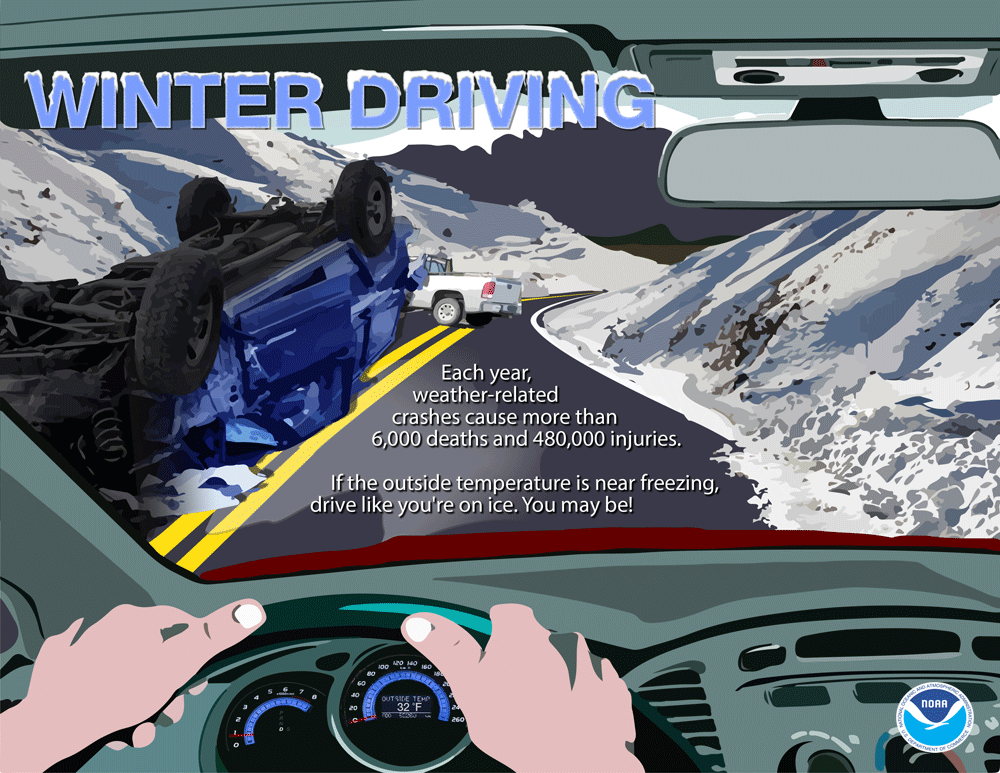On average, weather-related vehicle crashes kill 6,253 people and injure more than 480,000 each year, according to the Department of Transportation. Most of these accidents occur when the roadways are wet, snowy or icy. When the weather takes a turn for the worse this winter, take precautions if you have to be out on the roadways. Whether there is a coating of snow or ice on the roadways, or the asphalt just looks wet, SLOW DOWN! If the temperature is near freezing, drive like you’re on ice – you may be!
While dangerous road conditions are one of the most deadly hazards during winter, it’s not the only threat you may encounter. Other winter hazards include brutal cold, heavy snow and ice, dangerous flooding, extreme wind, and treacherous fog.
Nobody knows more about these weather hazards than NOAA’s National Weather Service. Here is what we recommend you do this winter:
- Know Your Risk
- Check weather.gov every morning before you leave home. It may be sunny in the morning but snowing in the afternoon. Be prepared.
- Take Action!
- Prepare for an emergency. Write a family communications plan so that everyone in your life knows how to stay in touch. Also, assemble an emergency supplies kit for your home. Make sure you have 72 hours of food, water and other necessary supplies in your kit.
- During a snow emergency, stay off the roads to allow emergency crews uninterrupted access to treat the roads, and if you must travel, allow extra time. Follow weather.gov to get the latest forecast information and expected conditions.
- Be A Force of Nature
- You’re an inspiration. Let people know that you have an emergency supplies kit and family communications plan – doing so will inspire others to action. Share your preparedness story on social media. Help the National Weather Service build a Weather-Ready Nation.
Safety and Health Information for Workers and Employers
The Occupational Safety and Health Administration (OSHA) provides resources for workplace preparedness and response to severe weather emergencies during the winter, including: floods and winter weather. Employers must ensure that workers involved in response and recovery are protected from potential safety and health hazards. OSHA also provides information and resources to assist in these efforts. OSHA and NOAA encourage workers and employers to be aware of weather forecasts, train workers on severe weather plans, and keep emergency supplies, including a battery-operated weather radio, on hand to be better prepared when severe weather strikes.
Get to Know NOAA
NOAA’s National Weather Service provides weather, water, and climate data and forecasts and warnings to protect life and property and enhance the national economy. Our goal is a Weather-Ready Nation, one that is prepared for and responds to weather-dependent events.
Here’s what we’re doing to prepare the public for winter weather hazards:
- NOAA’s National Weather Service leads Seasonal Safety Campaigns to prepare the public for seasonal weather hazards.
- NOAA issues a Winter Outlook every year to help the nation prepare.
- NOAA warns the public about severe weather through Wireless Emergency Alerts and NOAA Weather Radio.
- NWS has 122 Weather Forecast Offices around the country that issue winter weather watches, warnings and advisories.
- NOAA’s Weather Prediction Center provides snow and ice forecasts. It also recently added an experimental Day 4-7 Winter Weather Outlook.
For More Information
Make sure that you’re prepared for winter weather hazards by following NWS on Twitter and Facebook. Get the latest forecasts and learn more about weather preparedness.
Courtesy of NOAA

